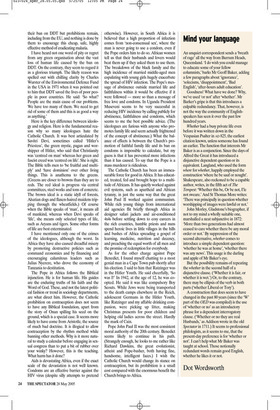Mind your language
An unquiet correspondent sends a ŌĆśbreath of rageŌĆÖ all the way from Burrum Heads, Queensland. ŌĆśI do wish you could manage to educate some of your fellow columnists,ŌĆÖ barks Mr Geoff Baker, adding a few paragraphs about ŌĆśignoranceŌĆÖ, ŌĆśsolecisms, ŌĆśdisappointmentŌĆÖ, ŌĆśBad EnglishŌĆÖ, ŌĆśafter-hours adult educationŌĆÖ.
Goodness! What have we done? Why, weŌĆÖve used ŌĆśor notŌĆÖ after ŌĆśwhetherŌĆÖ. Mr BarkerŌĆÖs gripe is that this introduces a culpable redundancy. That, however, is not the way the community of Englishspeakers has seen it over the past few hundred years.
Whether had a busy private life even before it was written down in the Vespasian Psalter in AD 825, the earliest citation known, unless someone has found an earlier. The function that interests Mr Baker is as a conjunction. Since the days of Alfred the Great it has introduced a disjunctive dependent question or its equivalent. Langland, who used the form where for whether, happily employed the construction ŌĆśwhere he be sauf or noughtŌĆÖ. Shakespeare, also reckoned to be a capable author, writes, in the fifth act of The Tempest: ŌĆśWhether this be, Or be not, IŌĆÖle not sweare.ŌĆÖ And St Thomas More writes: ŌĆśThere was principally in question whether worshipping of images were lawful or not.ŌĆÖ John Morley, GladstoneŌĆÖs biographer, if not to my mind a wholly suitable one, marshalled a neat subjunctive in 1872: ŌĆśMore than two generations had almost ceased to care whether there be any moral order or not.ŌĆÖ By suppression of the second alternative, whether comes to introduce a simple dependent question: ŌĆśwhether he was at homeŌĆÖ, ŌĆśwhether there was any newsŌĆÖ. This usage is the darling and apple of Mr BakerŌĆÖs eye.
But the possibility remains of repeating the whether in the second half of a disjunctive clause. (ŌĆśWhether it is fair, or whether it is wet.ŌĆÖ) Or, to the contrary, there may be ellipsis of the verb in both parts (ŌĆśwhether Liberal or ToryŌĆÖ).
A construction that does seem to have changed in the past 80 years (since the ŌĆśWŌĆÖ part of the OED was compiled) is the use of ŌĆśwhether or noŌĆÖ as an introductory phrase for a dependent interrogatory clause. (ŌĆśWhether or no they are real Husbands,ŌĆÖ as Addison wrote in the old Spectator in 1711.) It seems to professional philologists, as it seems to me, that the present-day preference is for ŌĆśwhether or notŌĆÖ. I canŌĆÖt help what Mr Baker was taught at school. Those notionally redundant words remain good English, whether he likes it or not.
Dot Wordsworth






















































 Previous page
Previous page